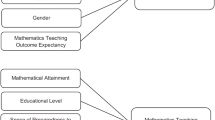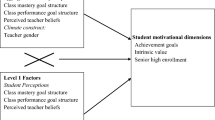Abstract
Student self-beliefs can shape their self-efficacy and influence achievement. Further, student self-beliefs can be influenced by teachers’ own beliefs and expectations for their students. Yet, the relations between teacher expectations, teacher and student gender, student mathematics achievement outcomes and self-efficacy have been little explored. Aotearoa New Zealand intermediate school students (n = 1314) and their teachers (n = 73) from three urban schools ranging in ethnicity and socioeconomic status, were surveyed at the beginning and end of one school year regarding their beliefs about and expectations of mathematics achievement, and student mathematics achievement was measured. ANOVAs determined that all teachers held greater expectations of their female as compared to male students’ mathematics achievement. No differences in self-efficacy to meet mathematics expectations or in self-efficacy to achieve in mathematics were demonstrated at the beginning of the year by student gender. However, boys exceeded girls in these regards by the years’ end. When student self-efficacy to meet expectations in mathematics was examined by teacher gender, male students demonstrated greater levels than female students at both year points in female teachers’ classes, suggesting the influence of teacher gender on student beliefs. Greater self-efficacy in mathematics organisation was evidenced for female students in both male and female teachers’ classes. Interestingly, no statistically significant difference in student mathematics achievement was noted by student gender either between or within the classes of male and female teachers. Student mathematics self-beliefs and achievement outcomes, their association with teacher and student gender, and implications for student futures are discussed.
Similar content being viewed by others
Notes
Decile ratings for all schools were based on school socioeconomic status and minority group composition from Decile 1 (low socioeconomic) to Decile 10 (high socioeconomic), such that 10% of schools fell into each decile. In 2023 the decile rating system was replaced with the Equity Index (https://parents.education.govt.nz/primary-school/schooling-in-nz/ministry-funding-deciles/).
References
Antecol, H., Ozkan, E., & Serkan, O. (2014). The effect of teacher gender on student achievement in primary school. Journal of Labor Economics, 33(1), 63–89.
Aydin, Y. C., & Uzuntiryaki, E. (2009). Development and psychometric evaluation of the high school chemistry self-efficacy scale. Educational and Psychological Measurement, 69(5), 868–880. https://doi.org/10.1177/0013164409332213
Bandura, A. (1986). Social foundations of thought and action: A social cognition theory. Prentice-Hall.
Bandura, A. (1997). Self-efficacy: The exercise of control. Freeman.
Beilock, S. L., Gunderson, E. A., Ramirez, G., & Levine, S. C. (2010). Female teachers’ math anxiety affects girls’ math achievement. Proceedings of the National Academy of Sciences of the United States of America, 107, 1860–1863. https://doi.org/10.1073/pnas.0910967107
Bonne, L. (2016). New Zealand Students’ mathematics-related beliefs and attitudes: Recent evidence. New Zealand Journal of Educational Studies, 51, 69–82. https://doi.org/10.1007/s40841-016-0035-2
Brophy, J. E., & Good, T. L. (1970). Teachers’ communication of differential expectations for children’s classroom performance: Some behavioral data. Journal of Educational Psychology, 61(5), 365–374. https://doi.org/10.1037/h0029908
Brown, G. T. L., Peterson, E. R., & Yao, E. S. (2016). Student conceptions of feedback: Impact on self-regulation, self-efficacy, and academic achievement. British Journal of Educational Psychology, 86(4), 606–629. https://doi.org/10.1111/bjep.12126
Carlana, M. (2019). Implicit stereotypes: Evidence from teachers’ gender bias. The Quarterly Journal of Economics, 2019, 1163–1224. https://doi.org/10.1093/qje/qjz008
Cvencek, D., Brečić, R., Gaćeša, D., & Meltzoff, A. N. (2021). Development of math attitudes and math self-concepts: Gender differences, implicit–explicit dissociations, and relations to math achievement. Child Development, 92(5), 940–956. https://doi.org/10.1111/cdev.13523
Devine, A., Fawcett, K., Szűcs, D., & Dowker, A. (2012). Gender differences in mathematics anxiety and the relation to mathematics performance while controlling for test anxiety. Behavioral and Brain Functions, 8(1), 33–41. https://doi.org/10.1186/1744-9081-8-33
Embretson, S. E., & Reise, S. (2000). Item response theory for psychologists. Erlbaum.
Fung, F., Tan, C. Y., & Chen, G. (2018). Student engagement and mathematics achievement: Unraveling main and interactive effects. Psychology in the Schools, 55(7), 815–883. https://doi.org/10.1002/pits.22139
Ganley, C. M., & Lubienski, S. T. (2016). Mathematics confidence, interest, and performance: Examining gender patterns and reciprocal relations. Learning and Individual Differences, 47, 182–193. https://doi.org/10.1016/j.lindif.2016.01.002
Goetz, T., Bieg, M., Lüdtke, O., Pekrun, R., & Hall, N. C. (2013). Do girls really experience more anxiety in mathematics? Psychological Science, 24(10), 2079–2087. https://doi.org/10.1177/0956797613486989
Gunderson, E. A., Ramirez, G., Levine, S. C., & Beilock, S. L. (2012). The role of parents and teachers in the development of gender-related math attitudes. Sex Roles, 66(3–4), 153–166. https://doi.org/10.1007/s11199-011-9996-2
Hartley, B. L., & Sutton, R. M. (2013). A stereotype threat account of boys’ academic underachievement. Child Development, 84(5), 1716–1733. https://doi.org/10.1111/cdev.12079
Hattie, J. (2009). Visible learning: A synthesis of over 800 meta-analyses relating to achievement. Routledge.
Holenstein, M., Bruckmaier, G., & Grob, A. (2022). How do self-efficacy and self-concept impact mathematical achievement? The case of mathematical modelling. British Journal of Educational Psychology, 92(1), 155–174. https://doi.org/10.1111/bjep.12443
Jaremus, F., Gore, J., Prieto-Rodriguez, E., & Fray, L. (2020). Girls are still being ‘counted out’: Teacher expectations of high-level mathematics students. Educational Studies in Mathematics., 105, 219–236. https://doi.org/10.1007/s10649-020-09986-9
Joët, G., Usher, E., & Bressoux, P. (2011). Sources of self-efficacy: An investigation of elementary school student in France. Journal of Educational Psychology, 103(3), 649–663. https://doi.org/10.1037/A0024048
Jussim, L., Eccles, J. S., & Madon, S. (1996). Social perception, social stereotypes, and teacher expectations: Accuracy and the quest for the powerful self-fulfilling prophecy. In M. P. Zanna (Ed.), Advances in experimental social psychology (Vol. 28, pp. 281–388). Academic Press.
Keller, C. (2001). Effect of teachers’ stereotyping on students’ stereotyping of mathematics as a male domain. Journal of Social Psychology, 141(2), 165–173. https://doi.org/10.1080/00224540109600544
Klee, H. L., Miller, A. D., & Buehl, M. M. (2023). Mathematics anxiety, self-concept, and self-efficacy: A multidimensional scaling consideration of measures. The Journal of Experimental Education, 91(3), 494–516. https://doi.org/10.1080/00220973.2021.2024788
Kyaruzi, F. (2023). Impact of gender on sources of students’ self-efficacy in mathematics in Tanzanian secondary schools. International Journal of School & Educational Psychology, 11(1), 72–85. https://doi.org/10.1080/21683603.2021.1945512
Lane, K. A., Goh, J. X., & Driver-Linn, E. (2012). Implicit science stereotypes mediate the relationship between gender and academic participation. Sex Roles, 66(3–4), 220–234. https://doi.org/10.1007/s11199-011-0036-z
Lindberg, S. M., Hyde, J. S., Petersen, J. L., & Linn, M. C. (2010). New trends in gender and mathematics performance: A meta-analysis. Psychological Bulletin, 136(6), 1123–1135. https://doi.org/10.1037/a0021276
Meissel, K., Meyer, F., Yao, E. S., & Rubie-Davies, C. M. (2017). Subjectivity of teacher judgments: Exploring student characteristics that influence teacher judgments of student ability. Teaching and Teacher Education, 65, 48–60. https://doi.org/10.1016/j.tate.2017.02.021
Meissel, K., & Rubie-Davies, C. M. (2016). Cultural invariance of goal orientation and self-efficacy in New Zealand: Relations with achievement. British Journal of Educational Psychology, 86, 92–111. https://doi.org/10.1111/bjep.12103
Ministry of Education. (2012). e-asTTle technical manual. Ministry of Education.
Mozahem, N. A., Boulad, F. M., & Ghanem, C. M. (2021). Secondary school students and self-efficacy in mathematics: Gender and age differences. International Journal of School & Educational Psychology, 9(sup1), 142–152. https://doi.org/10.1080/21683603.2020.1763877
NMSSA. (2022). National monitoring study of student achievement report 31: Mathematics and statistics contextual findings. Education Assessment Unit, University of Otago and New Zealand Council for Educational Research.
Raudenbush, S. W. (1984). Magnitude of teacher expectancy effects on pupil IQ as a function of the credibility of expectancy induction: A synthesis of findings from 18 experiments. Journal of Educational Psychology, 76(1), 85–97. https://doi.org/10.1037/0022-0663.76.1.85
Riegle-Crumb, C., & Humphries, M. (2012). Exploring bias in math teachers’ perceptions of students’ ability by gender and race/ethnicity. Gender & Society, 26(2), 290–322. https://doi.org/10.1177/08912432114346
Rubie-Davies, C. M. (2015). Becoming a high expectation teacher: Raising the bar. Routledge.
Rubie-Davies, C. M., & Hattie, J. C. (2012). The dangers of extreme positive responses in Likert scales administered to young children. The International Journal of Educational and Psychological Assessment, 11(1), 75–89.
Schoon, I. (2015). Explaining persisting gender inequalities in aspirations and attainment: An integrative developmental approach. International Journal of Gender, Science, and Technology, 7, 155–165.
Siegle, D., & McCoach, D. B. (2007). Increasing student mathematics self-efficacy through teacher training. Journal of Advanced Academics, 18(2), 278–312. https://doi.org/10.4219/jaa-2007-353
Timmermans, A. C., Kuyper, H., & van der Werf, G. (2015). Accurate, inaccurate, or biased teacher expectations: Do Dutch teachers differ in their expectations at the end of primary education? British Journal of Educational Psychology, 85(4), 459–478. https://doi.org/10.1111/bjep.12087
Voyer, D., & Voyer, S. D. (2014). Gender differences in scholastic achievement: A meta-analysis. Psychological Bulletin, 140(4), 1174–1204. https://doi.org/10.1037/a0036620
Wang, M. T., & Kenny, S. (2014). Gender differences in personal aptitude and motivational beliefs for achievement in and commitment to math and science fields. In I. Schoon & J. S. Eccles (Eds.), Gender differences in aspirations and attainment. A life course perspective (pp. 266–284). Cambridge University Press.
Watson, P., Rubie-Davies, C. M., Meissel, K., Peterson, E. R., Flint, A., Garret, L., & McDonald, L. (2016). Gendered teacher expectations of mathematics achievement in New Zealand: Contributing to a kink at the base of the STEM pipeline? The International Journal of Gender, Science and Technology, 8, 83–102.
Watt, H. M. G. (2010). Gender and occupational choice. In J. C. Chrisler & D. R. McCreary (Eds.), Handbook of gender research in psychology (pp. 379–400). Springer.
Weinstein, R. S. (1989). Perceptions of classroom processes and student motivation: Children’s views of self-fulfilling prophecies. In R. Ames & C. Ames (Eds.), Research on motivation in education. Academic Press.
Yu, W., Zhou, S., & Zhou, Y. (2023). Measuring mathematics self-efficacy: Multitrait-multimethod comparison. Frontiers in Psychology, 14, 1108536. https://doi.org/10.3389/fpsyg.2023.1108536
Funding
Early Career Research Excellence Award (ECREA) funding was awarded to the second author from the University of Auckland.
Author information
Authors and Affiliations
Contributions
All authors contributed to the study conception and design. Material preparation, data collection and analysis were performed by Penelope Watson and Christine Rubie-Davies. The first draft of the manuscript was written by Penelope Watson and all authors commented on previous versions of the manuscript. All authors read and approved the final manuscript.
Corresponding author
Ethics declarations
Conflict of interest
On behalf of all authors, the corresponding author states that there is no conflict of interest.
Additional information
Publisher's Note
Springer Nature remains neutral with regard to jurisdictional claims in published maps and institutional affiliations.
Rights and permissions
Springer Nature or its licensor (e.g. a society or other partner) holds exclusive rights to this article under a publishing agreement with the author(s) or other rightsholder(s); author self-archiving of the accepted manuscript version of this article is solely governed by the terms of such publishing agreement and applicable law.
About this article
Cite this article
Watson, P.W.S.J., Rubie-Davies, C.M. Teachers’ Expectations of Student Mathematics Achievement, and Student Mathematics Self-Efficacy in Aotearoa New Zealand Intermediate Schools: Do Teacher and Student Gender Make a Difference?. NZ J Educ Stud (2023). https://doi.org/10.1007/s40841-023-00303-5
Received:
Accepted:
Published:
DOI: https://doi.org/10.1007/s40841-023-00303-5




